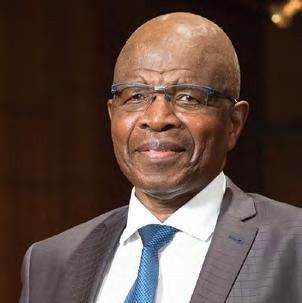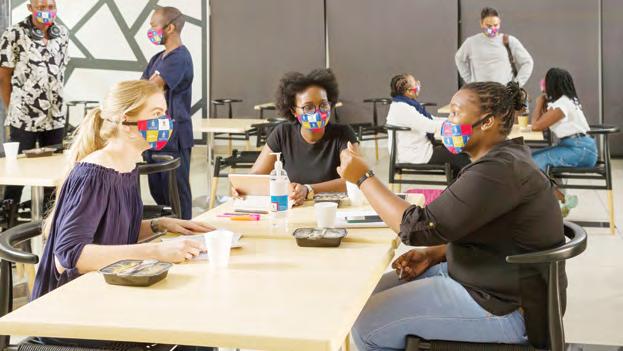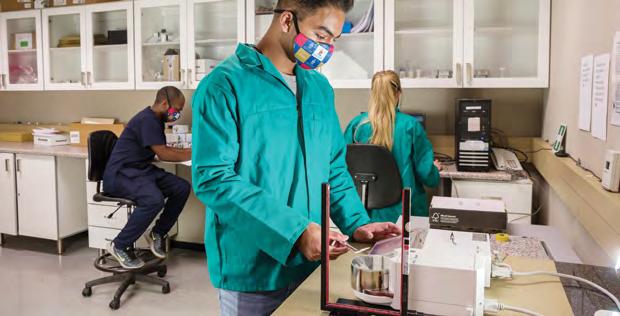
7 minute read
Message from the Chancellor
Prof Wiseman Lumkile Nkuhlu
With every crisis there is opportunity and in true testimony to the spirit and resolve of the University of Pretoria (UP), we turn crises into opportunities, not the least of them the COVID-19 pandemic. As Vice-Chancellor Professor Kupe puts it: “The COVID-19 pandemic is not only a disease crisis, it is a crisis of society, of the economy, of sustainability and well-being, and of governance on the continent and globally. It is a big wake-up call to think and do differently, with our universities playing an essential role in co-creating the future we want.”
Right now, a unique opportunity exists for all our staff, students and graduates to contribute to substantially changing society and communities for the better, as defined by the United Nation’s 17 Sustainable Development Goals (SDGs).
Both the SDGs and the African Union’s Agenda 2063 call for joint action to address poverty and inequality. Quality higher education and knowledge creation are fundamental building blocks in achieving this and contributing to job creation, employment and economic growth, all of which are essential for a more stable, just and prosperous continent.
At UP we regard this as a calling. The Vice-Chancellor put it thus during the Africa Week programme co-hosted by UP and the Sustainable Development Solutions Network, “Our success depends on a world that is thriving, where human dignity and justice are paramount, where all people are able to reach their full potential while nobody is left behind, and where our development does not
Prof Wiseman Lumkile Nkuhlu
happen at the expense of our planet. We recognise the critical role that our university and our graduates must play in securing the future of our country and continent.”
All ten of the world’s countries with the youngest populations are in Africa, with approximately 65% of the continent’s citizens below the age of 35. So the continent has the benefit of young people’s energy and ability to work, provided that viable opportunities for education and economic inclusion exist. To achieve this we have to address the digital divide in Africa, as connectivity and data affordability are a pressing issue in all our countries. We need to focus on ensuring access to technology for the majority of people and upskilling as

many as possible to be tech savvy. In terms of higher education, digital skills and capabilities are a necessity for all students and graduates.
We are keenly aware that the pandemic has amplified the structural inequalities in our country’s education system. South Africa’s national Department of Higher Education and Training estimated that only about 20% of learners were reached through the various online platforms utilised during lockdown. To achieve universal access in South Africa, the government must be held accountable on its commitment to all learners and students. Pledges from Cabinet in 2013 to deliver free broadband access to 90% of the population by 2020 and 100% by 2030, are far from being achieved. Meanwhile, in 2019, UP invested R100 million in the digitalisation of its systems – a godsend during the pandemic, enabling digital access across the board for students and academics.
To accelerate higher education’s contribution to development requires cross-boundary partnerships that transcend geographies, disciplines and sectors, locally and internationally. The University has been hard at work on this imperative throughout 2020, and forged a number of national, continental and international partnerships, with digital skills, internationalisation of knowledge and entrepreneurial opportunities as key components.
The groundwork was also laid for key dialogues and initiatives. For example, the preparation and negotiation for the organisation and presentation of Africa’s first Nobel Prize Dialogue, which UP hosted in May 2021, took place in 2020. This initiative brought together Nobel laureates, opinion leaders, policymakers, students, researchers and citizens to engage in conversations on “The Future of Work”. UP will also be launching a Centre for the Future of Work that will, through interdisciplinary research, create the knowledge to enable our country and continent to be future fit.
It pleases me enormously to see how committed UP is to our graduates being not only eminently employable, but also self-employable. Entrepreneurship is now widely recognised as being as important in higher education as postgraduate studies, and as a major driver of innovation. UP aspires to exceptional achievement in the alliance of critical knowledge and critical thinking, innovation, and entrepreneurship.
The University fosters entrepreneurial skills among its students through entrepreneurship programmes, business incubators and small business development portals. The research and development exposure that our students gain, particularly in postgraduate studies, coupled with the knowledge of how to create, grow and sustain a business, equips them to enter the market as start-up or small business owners. This is also a catalyst for UP becoming an entrepreneurial university.
While the internationalisation of large corporates or multinationals is long established, the linking of small businesses to international value chains and markets is a nascent trend. However, it has gained impetus over the past 12 years, spurred by the economic crisis in 2008, when local markets became too unstable to maintain a solely local focus. In these highly turbulent and unpredictable times, we continue to be compelled to boost our businesses and economies beyond geographic boundaries.
The TuksNovation ecosystem provides specialised support to entrepreneurs throughout their startup growth journeys, and it connects science and technology innovators with big companies, academics and government. TuksNovation leverages innovative thinking and personifies the UP spirit of new energies for new times.
Start-up or small business incubation in higher education institutions can enable a new form of internationalisation that provides huge potential for cooperation, collaboration and partnerships at every level, turbocharged by digitalisation.
Augmented and virtual reality laboratories and knowledge creation environments are sprouting up worldwide and being very effectively used. The University’s Department of Mining Engineering has the Kumba Virtual Reality Centre for Mining – the only one in Africa – where our students are able to experience being underground in a mine, virtually.
It should be added that, in the latest QS World University Rankings, UP has just been ranked as one of the top 50 places in the world to study minerals and mining engineering.
In these same rankings, theology, religion and divinity in our Faculty of Theology and Religion were ranked in the top 100 and their citations were ranked amongst the top worldwide, ahead of some of the most prestigious universities in Europe. Why? Because, as the Dean of the Faculty of Theology and Religion, Prof Jerry Pillay, explains, UP’s focus is on relevant, contextual, transformative research, to provide new knowledge that inspires people to reconsider what we think and do in our everyday lives and encourages positive change. He adds that there is a revival of introspection in terms of what is happening in the world; there is a reawakening to the realities of life.

An exciting reality is that a world of opportunity has opened for all our faculties in the borderless, digitalised environment. It enables a new form of internationalisation that potentially provides far greater access for African universities. Pre-COVID, so much more travel was required, often from the Global South to the Global North. Now, with digital access, students and academics may not need to travel as much to engage internationally.
As part of the internationalisation of knowledge that digitalisation facilitates, universities worldwide need to share expertise and partner in addressing the Sustainable Development Goals (SDGs) in collaboration with communities, industries and governments. An example of such a collaboration is the Australia Africa Universities Network (AAUN), of which UP is a member, and I serve as co-president. The network comprises ten Australian universities and twelve African universities which collaborate in researching a range of issues – from education to public health, to food security.
Collaborations and partnerships also need to address the requirements of the Fourth Industrial Revolution (4IR), hence UP’s extensive transdisciplinary curriculum in 4IR fields, including big data science, data analytics and artificial intelligence, offered through a range of departments and schools. We participate in the Centre for Artificial Intelligence Research (CAIR) – a South African national research network of five universities that
research various aspects of artificial intelligence (AI). We recently launched the Engineering 4.0 facility, dealing with all things digital in the transport and mobility space, and we are training students in how smart cities and intelligent transport will work.
We are also pursuing research on AI ethics, and our Student Counselling Unit has just activated Scooby, a first-of-itskind counselling chatbot. It is a primary mental healthcare resource for students to supplement traditional counselling services in a virtual setting. The initiative enables students to build personalised self-help toolkits that address mood, stress and lifestyle to help them cope and pursue their academic goals. Chatbots are also successfully integrated into other areas of the University.
It’s not an easy time, but it is a fascinating time for our students and graduates to be pursuing their studies, careers and lives. Backed up by the best possible higher education, whichever career they pursue, they can do so with the utmost confidence as a graduate of the University of Pretoria.
Prof Wiseman Lumkile Nkuhlu
Chancellor







